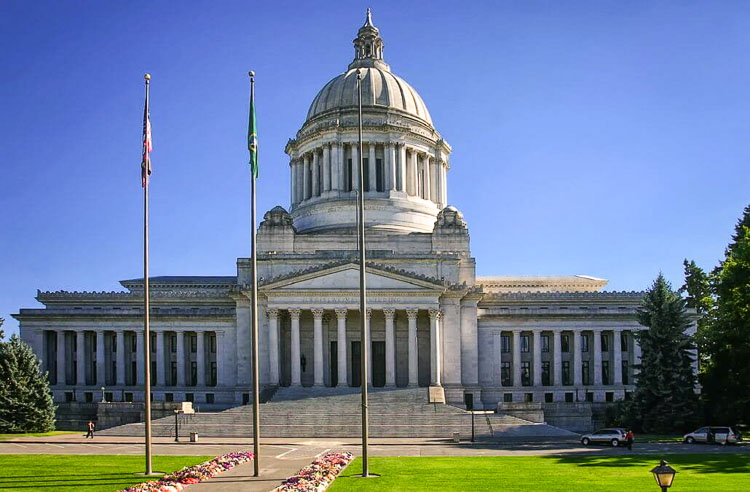
Jason Mercier of the Washington Policy Center shares details of the capital gains income tax repeal effort
Jason Mercier
Washington Policy Center
The I-1929 (capital gains income tax repeal) ballot title challenge is slowly moving forward. Yesterday the I-1929 campaign filed its opening brief. The campaign told the Thurston County Superior Court:

“Additionally, the proposed ballot title and ballot measure summary for I-1929 will mislead Washington voters about the measure’s content and create undue prejudice against it: the AGO’s proposed ballot title and ballot measure summary describe RCW 82.87 as an ‘excise tax’ on the sale or exchange of certain capital assets despite the Superior Court ruling that RCW 82.87 is not an excise tax but an income tax.
That ruling has been in place at every step of I-1929’s process to date: when I-1929 was filed, when the AGO issued the ballot title letter, and when this appeal was filed. In an effort to create prejudice against I-1929, the AGO’s proposed title picks one side of the ‘excise tax’ vs ‘income tax’ debate about the nature of the tax, and it has picked the side rejected by the only court that will have considered the issue by the time the measure goes to the ballot in November . . .
The Court can resolve these problems by revising the proposed ballot title and ballot measure summary for I-1929. Petitioners have proposed a title and summary that avoid these issues, striking a middle ground in the ‘income tax’ versus ‘excise tax’ debate such that the descriptions are accurate regardless of how that litigation ultimately resolves.”
The brief continues:
“On March 1, 2022, Douglas County Superior Court held that the RCW 82.87 capital gains tax is properly characterized as an income tax and that, as an income tax, it is an unconstitutional property tax. The Court listed a number of ‘incidents’ of the tax that showed ‘the hallmarks of an income tax rather than an excise tax.’ These included the tax’s reliance on federal IRS income tax returns; IRS’s characterization of the tax as an income tax; the annual levy of the tax, not at the time of each transaction; the tax’s application to net capital gain rather than gross value; consideration of various deductions and exclusions; and its imposition on individuals only rather than also on corporations.
On March 22, 2022, the Court issued its order rejecting the State’s contention that the tax was an ‘excise tax,’ declaring the capital gains tax unconstitutional and invalid and, therefore, void and inoperable as a matter of law . . .
The AGO’s proposed ballot title and ballot measure summary ignore the Douglas County Superior Court’s declaratory judgment ruling and state that I-1929 would repeal an ‘excise tax.’ The summary also wrongly states the tax would apply to transactions (‘the sale or exchange’) rather than income. However, a person could engage in dozens of sales or exchanges of assets and pay no tax; the tax only applies if the net income from those sales is above $250,000. The AGO’s proposal is thus misleading and creates prejudice against I-1929. The Court should reject it and revise it as explained in detail below.”
The I-1929 campaign proposes this alternative ballot title and summary:
Making the case for its proposed language the brief says:
“As a predicate matter, labeling RCW 82.87 an excise tax is neither true nor impartial and will confuse voters. On March 1, 2022, Douglas County Superior Court held that RCW 82.87 is an income tax and not an excise tax. Following that ruling, on March 22, 2022, the Court issued an order declaring RCW 82.87 ‘unconstitutional and invalid and, therefore, void and inoperable as a matter of law.’
As of the date of this ballot title appeal, that order is still in effect but has been appealed. And while the appellate process has not run its course, there is no guarantee that (1) the process will be completed by the time of the vote on this measure or (2) the Douglas County Superior Court order will be reversed. A ballot title that describes the law as the State hopes it to be, not as the law is currently characterized, is not accurate and is drafted to the benefit of the measure’s opponents. The Court should not adopt a title that picks a side in the ongoing fight over the proper characterization, much less the side that has been rejected by the only court to have ruled on the issue. Labeling RCW 82.87 an excise tax will also confuse the average informed voter, who will know from personal experience that a capital gains tax is an income tax . . .
Here, a Superior Court has held that RCW 82.87 is not an excise tax. If that ruling is not overturned by the time of the vote, a ballot title stating RCW 82.87 is an excise tax would be untrue and would mislead voters. The ballot title should reflect the law as it is at the time of the vote, to avoid misleading voters. Implicit in the Wash. Citizens decision is that an initiative should not have a title that conveys an inaccurate characterization of the law being amended or repealed, especially if that characterization has been rejected in the course of ongoing litigation.”
A reply brief by the Attorney General is due on April 21. A court date has yet to be set for the case. The I-1929 campaign cannot begin to gather signatures until the ballot title challenge process is completed. To qualify for the ballot, signatures of at least 324,516 (405,000 recommended) registered voters are due no later than 5 p.m. on July 8, 2022.
Jason Mercier is the director of the Center for Government Reform at the Washington Policy Center.









